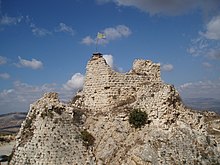Nabatieh
النبطية | |
|---|---|
City | |
 Nabatieh, 2006 | |
| Coordinates: 33°21′50″N 35°29′15″E / 33.36389°N 35.48750°E | |
| Grid position | 125/160 L |
| Country | |
| Governorate | Nabatieh Governorate |
| District | Nabatieh District |
| Area | |
| • City | 8 km2 (3 sq mi) |
| • Metro | 21 km2 (8 sq mi) |
| Elevation | 418 m (1,371 ft) |
| Population | |
| • City | 40,000 |
| • Metro | 85,000 |
| Time zone | UTC+2 (EET) |
| • Summer (DST) | UTC+3 (EEST) |
| Dialing code | +961 |


Nabatieh (Arabic: النبطية, Nabaṭiyya, Syriac-Aramaic: ܐܠܢܒܛܝܥ), or Nabatîyé (IPA: [ˈnabatˤɪje]), is the city of the Nabatieh Governorate, in southern Lebanon. The population is not accurately known as by as no census has been taken in Lebanon since the 1930s; estimates range from 15,000 to 120,000. A 2006 population estimate by the now-closed German population site called World Gazetteer put the population at 100,541, which would make it the fifth largest city in Lebanon, according to the 2006 population estimates of Lebanese cities,[1] but after an update in either 2007 or 2008 and calculations for the following years the 2013 population estimate turned out to be much lower at 36,593 and making the city the 11th largest in Lebanon behind Tyre, Bint Jbeil, Zahlé, Sidon, Baalbek, Jounieh, Tripoli and Beirut according to those 2013 estimates.[2] It is the main city in the Jabal Amel area and the chief center for both the mohafazat, or governorate, and the kaza, or canton both also called Nabatieh. Nabatieh is an important town both economically and culturally.
A market is held every Monday where traders and visitors from neighbouring villages gather in the centre of the town to exchange their goods in an area known in Arabic as the Souq Al Tanen. There are also branches of several banks, hospitals, restaurants and cultural centres of interest to tourists. Every year, the city commemorates the Battle of Karbala to remember the martyrdom of Imam al Husayn.
Nabatieh is the birthplace of several scholars, including linguist and Arab nationalist leader Ahmad Rida, historian Muhammad Jaber Al Safa, scientist Hassan Kamel Al-Sabbah (nephew of Ahmad Rida) and theologian Sheikh Ahmed Aref El-Zein.
The most accepted theory is related to the Nabateans (spelled النبطي), an ancient Arab civilization that inhabited northern Arabia and the southern Levant. The name of the city colloquially is, النبطية meaning in a broader linguistic sense “the Nabatean” in a feminine form, a form which would have been used to name cities (e.g. Alexandria, Egypt). [3]
Alternatively, this form of the word may have been in the genitive case as well due to the presence of a definite article. In addition, the feminization may have been used for noun agreement, therefore the city may have been referred to in some variation by its early inhabitants as القرية النبطية , "the village of the Nabateans” or possibly some other toponym using the feminine form. Due to the city’s possible origins as a trading outpost (explained below), it could have also been السوق النبطية "the market of the Nabateans”, or some other variant which would have gradually been reduced to simply النبطية. [3]
The Nabatean Kingdom (3rd century BC – 106 AD) extended its greatest height between 85-71 BC in which they controlled Damascus. Between this period and the Roman period, there have been instances of Nabatean inscriptions and coinage in Sidon, which would have been the closest major port to Nabatieh. Therefore, being in the hinterland and at the foothills of the Lebanon mountains between Sidon and Damascus, the city may have been a trading stop or station for the Nabateans, thereby owing its name to them. One modern tradition that may have carried over from this ancient foundation is the weekly souk (souq el-tanen) which takes place every Monday and merchants from surrounding villages come to sell their goods. [3]
- ^ "World Gazetteer: Lebanon - largest cities (Per geographical entity)". Archived from the original on 16 March 2006. Retrieved 16 March 2006.
- ^ "World Gazetteer: Lebanon - largest cities (Per geographical entity)". Archived from the original on 25 June 2013. Retrieved 3 August 2015.
- ^ a b c Kesserwani, Ali. "History of Nabatieh, Lebanon (Prehistory to Antiquity)".
